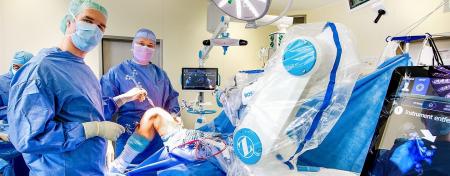Rheumatology in Berlin

Rheumatic diseases tend to be very painful and inflammatory conditions. They can affect people of all ages, even children and adolescents. Rheumatoid arthritis is particularly common and involves very painful joints, though soft tissue (muscles, ligaments and tendons) can be affected as well as joints and bones.
Rheumatology is a sub-discipline of internal medicine that is concerned with diagnosing and treating autoimmune disorders, which tend to be chronic. Examples of common rheumatic conditions are rheumatoid arthritis, soft tissue rheumatism, ankylosing spondylitis, joint inflammation due to infection or psoriasis, and systemic lupus erythematosus. Most non-inflammatory rheumatic conditions are symptoms of ageing or wear, or are due to injuries that can be treated by specialists in orthopaedics.
Anti-inflammatory drugs are used to treat rheumatic diseases. Additional relief can be provided by physiotherapy, occupational therapy or physical therapy. For some patients with a rheumatic condition in an advanced stage, surgery is the only option, the affected joint being either stiffened or replaced by an artificial one. A special diet can often have a positive impact on the therapy outcome.
Clinics and praxises
9 results
Klinikum Ernst von Bergmann (Potsdam)
Helios Klinikum Berlin-Buch
Immanuel Krankenhaus Berlin (Buch)
Immanuel Hospital Berlin (Wannsee)
MEOCLINIC
Charité – Campus Mitte
Charité – Campus Benjamin Franklin
Immanuel Klinikum Bernau
Immanuel Klinik Rüdersdorf
Comprehensive medical care

Your Checklist – for a pleasant stay
-
1 Preparations
Describe your concerns and send the necessary documents to the hospital.
-
2 Relevant documents
Inform yourself about your medical visa and select all documents.
-
3 Stay
Inform yourself in time about your hospital and a appropriate accommodation.
-
4 After discharge
Verify if you will need a medication or further treatment.













